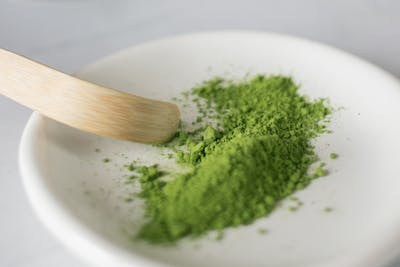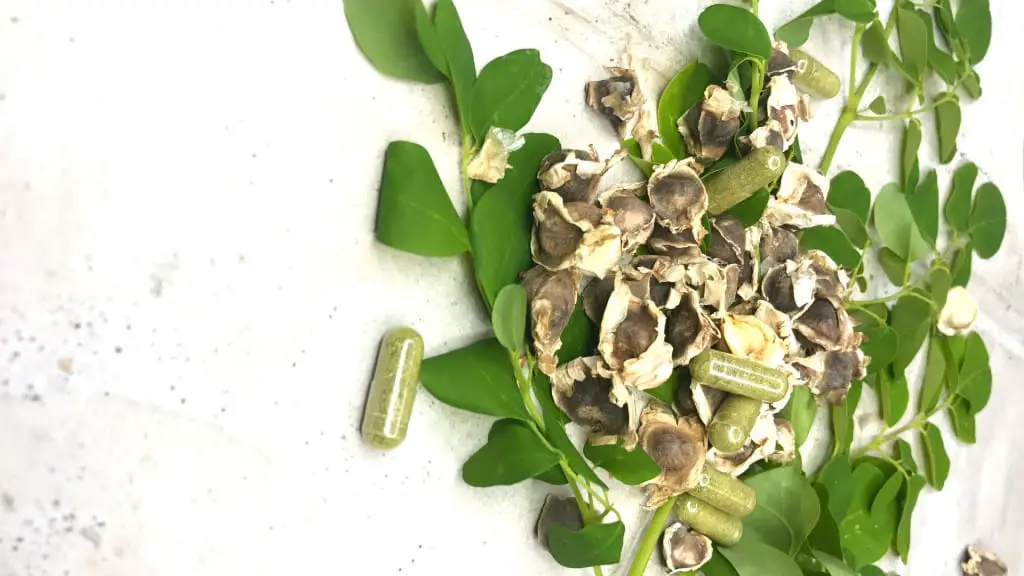If you pop open your medicine cabinet right now, chances are you’ll see a bottle of aspirin staring back at you. According to Statista, we produce 40 thousand metric tons of aspirin each year. That’s a huge number, but it makes sense; pain is something everyone deals with, and many deal with it chronically. The problem with anti-inflammatories like aspirin, however, is that they occasionally leave you with debilitating side-effects, especially if you’re using them over a prolonged period of time. Researchers have been studying plant- and food-based alternatives to non-steroidal anti-inflammatory drugs (NSAIDs) for decades and alternatives that offer the same inflammation-fighting benefits with none of the negative side effects. And in the past 20 years, that attention has turned to Moringa. So what does research say? Is Moringa, in fact, an anti-inflammatory?
Moringa’s anti-inflammatory properties have been studied for decades, and all available research suggests that Moringa has the ability to decrease inflammation at a rate similar to prescription NSAIDs. The antioxidants (flavonoids included) and isothiocyanates in Moringa all work together to decrease and inhibit inflammation, making Moringa an anti-inflammatory on par with aspirin or indomethacin.
Moringa Oleifera’s anti-inflammatory properties are arguably what it’s most known for; scientists all over the world have studied this specific ability for years. We’ll be discussing why Moringa works so well to decrease inflammation. Before we dive in, though, let’s talk briefly about inflammation itself.
Want to know about the right Moringa Products to buy? We just published an article about the best six Moringa powders that we recommend in 2024.

An Overview Of Inflammation
Inflammation isn’t necessarily negative. It’s a defense mechanism and your body’s way of telling your white blood cells that some type of irritant or foreign body has made its way inside of you. Inflammation is an evolutionary response to injury or sickness; it has an incredibly important purpose.
The issue lies in the fact that inflammation sometimes occurs even when there’s no infection or irritant to fight. Rheumatoid arthritis, celiac disease, IBD: all of these diseases result in and/or are the result of inflammation. Current research even suggests that chronic inflammation might be at least partially responsible for 15-25% of human cancers.
You can buy NSAIDs at basically any gas station or grocery store in the United States. I used them for nearly a year when I was 18; I had tendonitis, even clenching my fists caused pain to go shooting up my arms, and ibuprofen was the only thing that could give me even the smallest amount of relief. But NSAIDs have side-effects, and using them for an extended period of time can make both the risk and the severity of those side-effects much worse. That year of ibuprofen gave me recurring nausea for months. I was lucky; extended use of NSAID can result in everything from ulcers and gastrointestinal bleeding to an increased risk of blood clots, heart attacks, or strokes.
Researchers have spent decades studying foods with anti-inflammatory properties precisely for this reason: because they want to fight inflammation without the risk of negative side-effects. In the last several decades, scientists have become more and more sure that Moringa can do precisely that.
Moringa is Full of Inflammation-Fighting Polyphenols

In 20 words or less, what is a polyphenol?
Polyphenols are chemicals found in plants and plant-based foods, which includes everything from fruits and vegetables to coffee and wine. Polyphenols are fantastic antioxidants. There are thousands of polyphenols found in nature, all divided into separate categories, but we’ll be focusing on two of those categories: flavonoids and phenolic acids.
Flavonoids are found in almost every fruit and vegetable, and are one of the reasons fruits and veggies so good for us. They work as a type of antioxidant; they’re anti-inflammatories; in fact, over the last few years, scientists have started trying to figure out whether flavonoids themselves are the reason fruit- and vegetable-heavy diets work towards preventing cancers and other diseases.
Moringa, if it isn’t obvious, has a whole lot of flavonoids.
There are three major flavonoids in Moringa: kaempferol, myrecytin, and quercetin. All of these flavonoids are strong antioxidants; in studies, they’ve displayed everything from anti-inflammatory properties to anti-diabetic ones. Research suggests that these flavonoids are part of the reason Moringa is able to decrease inflammation so well.
But flavonoids aren’t the only reason! Moringa also has something called phenolic acids. Phenolic acids are also found in a lot of plant foods, and scientists have shown that they’re capable of fighting everything from inflammation to cellular mutations.
Moringa is Also Jam-Packed with Other Antioxidants
This section is closely related to the above one, because flavonoids themselves are also antioxidants. Because flavonoids are plant-based and are only one type of antioxidant in a world filled with antioxidants, however, I feel it would be remiss not to mention the many, many other antioxidants that Moringa contains.
10 grams of Moringa powder (about a tablespoon and a half) will give you nearly 10 mg of Vitamin E, or more than 60% of your daily recommended intake. Moringa contains manganese, vitamin C, selenium. In fact, current research says that Moringa has 46 antioxidants in all.
Study after study has shown that antioxidants work to fight inflammation. They help prevent cardiovascular disease. They inhibit the oxidative stress caused by free radicals.
Any fruit- and vegetable-heavy diet is going to provide you with important antioxidants. But Moringa has more antioxidants than most, and that’s one of the reasons science suggests it does so well at preventing and fighting inflammation.
Want to know where to find the right gear to grow your Moringa? Or the right Moringa Product to buy? Check out our Buyer’s Guide, we review it all there!
Moringa is a Huge Source of Isothiocyanates

Isothiocyanates are a type of chemical group found most commonly in cruciferous vegetables, like broccoli, cauliflower, bok choy, and kale. Scientists have been interested in them for years and for a number of reasons, especially because there’s research suggesting that isothiocyanates can prevent or inhibit cancer. Another ability of isothiocyanates, though, is their anti-inflammatory properties.
The isothiocyanates found in Moringa are pretty similar to those found in broccoli or cauliflower. The difference, however, is that unlike those found in other vegetables, Moringa’s isothiocyanates contain something called a sugar moiety. A sugar moiety is basically a sugar molecule attached to the rest of a chemical chain, and some pretty interesting studies have shown that those sugar molecules actually help the human body absorb flavonoids better.
In other words, because Moringa has that sugar moiety, its isothiocyanates are actually more stable than the ones you’ll find in veggies like kale or broccoli, which means 1) that your intestine will absorb them better, and 2) they’re going to help your body fight inflammation way more.
So How Does Moringa Compare to OTC and Prescription Anti-Inflammatories?
The answer to this question is “pretty darn well.”
There have been several studies conducted by researchers comparing Moringa to other anti-inflammatories, from aspirin to indomethacin to food products like turmeric/curcumin. Every single one of those studies seems to reach the same conclusion: that Moringa is either comparable or superior to what you can get over the counter or from a pharmacy.
One study found that an aqueous root extract had a similar effect on inflammation as indomethacin, better known as Tivorbex. Tivorbex is an NSAID powerful enough that it requires a prescription. Its potential side-effects include nausea, headaches, and (in very rare but serious cases) liver damage.
Another study compared Moringa with both aspirin and with the curcumin found in turmeric. Researchers have studied turmeric’s anti-inflammatory abilities for years, and while results have been mixed (some research shows far more promising results than others), it’s generally agreed by scientists (and by those who use it, myself included) that turmeric does have at least some anti-inflammatory properties. In this study, however, Moringa blew turmeric out of the water. At both high and low does, Moringa reduced inflammation much more than curcumin did. Its results, actually, were far more in line with that of aspirin, albeit with none of the negative side effects.
Conclusion
There are several reasons Moringa works so well as an anti-inflammatory. It’s very likely that the three reasons listed above are not the only ones; research continues, and scientists learn more about Moringa each year. But while we still have a lot to learn, studies show that Moringa seems to be just as good at reducing inflammation as OTC and prescription NSAIDs while coming with none of the negative side effects.
Always consult with your doctor before making a change in your diet, but do so: talk to them. If they agree that it makes sense for you to try it out, add Moringa to your diet. Share your stories. We are always happy to hear from you.
And if you want to learn more about Moringa’s many health benefits, check out our “Moringa Nutrition Facts” article.

For years now, Moringa has been a daily consumption in my life, incorporated in various forms such as capsules, food recipes, and soothing teas. Initially, my daughter and I embarked on this journey as an experiment, but as time went on, I delved deeper into its remarkable potential and unearthed the unlimited benefits it offers for our well-being and health. I got motivated by how much it positively impacted me and decided to share my insights about Moringa’s profound impact on health and overall living through my blog posts.
